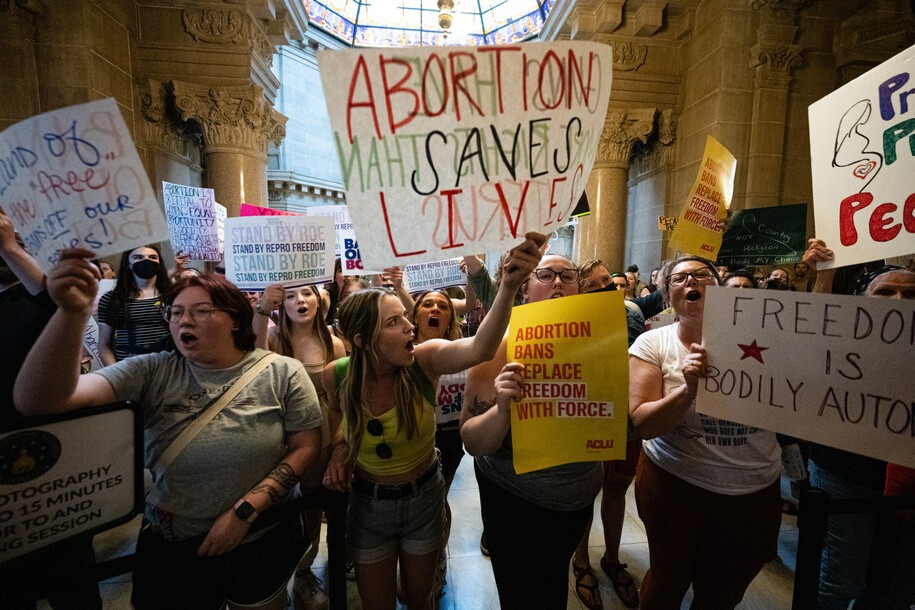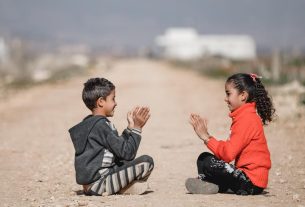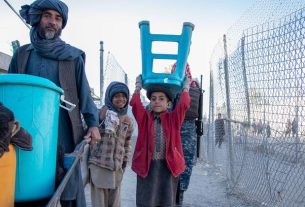“The only thing that’s changed in the last six months is that people are realizing the thing we’ve been talking about and thinking for the last decade is real, and it’s here, and that their loved ones are being affected,” said Renee Bracey Sherman, founder and executive director of We Testify. “I think people are starting to wake up to that, but unfortunately, it feels a bit late.”
Attacks on abortion rights began long before Roe was overturned, with the Hyde Amendment limiting health insurance coverage for folks working to make ends meet. Advocates also cite Texas SB 8 and other bills that drastically limit abortions to six weeks gestation, when fetuses do not have developed hearts despite the misleadingly titled “fetal heartbeat” bills. At six weeks, people may not even be aware that they are pregnant. Beyond legislative issues, some parts of the country have always been abortion deserts, where patients have to travel miles to access care to begin with. According to Paris Hatcher, executive director of Black Feminist Future, patients in Georgia were already dealing with the reality of a lack of care, as 96% of the state’s counties did not have an abortion provider.
“It was already a trying situation,” said Hatcher. “It really has taken a difficult situation and made it impossible. Now people are being sent out of the state. Now the cost of an abortion procedure has doubled to quadrupled because now you have to factor in travel, more days off of work. It has created an impossible situation for so many people.”
At least 66 abortion clinics have closed or stopped offering abortions since Roe was overturned, forcing patients to either seek care across state lines or be forced to carry to term. Even in states where abortion remains legal or has had protections enshrined into law, patients are feeling the impact of backlogged appointments due to increased demand from out-of-towners.
Though a post-Roe world affects all people of reproductive age and their families, people of color feel the worst of the impact, including Latino people. According to research from the National Latina Institute for Reproductive Justice and National Partnership for Women and Families, 6.5 million Latino people are affected by state abortion bans, with 42% of all Latinas ages 15-49 living in the 26 states that have banned or are likely to ban abortion. Together, they represent the largest group of people of color impacted by current or likely state abortion bans.
“In terms of the numbers, it’s really intense,” said Lupe M. Rodríguez, executive director of the Latina Institute. “Many of the places where folks have been getting this care for abortion are also places where these same individuals were getting other kinds of reproductive health care and preventative reproductive health.”
According to Rodríguez, closing abortion clinics means patients have also lost access to preventative and general health care. Post-Roe, many state Supreme Courts have also blocked abortion bans only to overturn them shortly after, causing rampant misinformation and confusion for patients on the actual legality of the procedure in their communities.
“Even folks who live in states where abortion is still legal and accessible for the most part are under the impression that abortion is illegal across the country,” said Rodríguez. “The changing state of affairs because of the Dobbs decision has really made the environment pretty ripe for misinformation, which is affecting folks across the country, not just the ones who are in those 26 states that have already or are likely to ban abortion.”
On social media, organizers have also reported censorship of their abortion-related posts. On the day of the midterm elections in November, Hayley McMahon—an abortion advocate and member of the Abortion On Our Own Terms campaign—was removed from Twitter for a tweet about self-managed abortion, which the platform flagged as a violation of their policy on “self-harm.” McMahon posted the original tweet on Oct. 31 but was removed from Twitter a week later, on Election Day.
“From a health and autonomy standpoint, I think folks need that information to be able to make that decision for themselves,” said McMahon. “The Twitter suspension notice said that it was promoting suicide or self-harm, which was what was particularly upsetting about everything, when in fact it was very clearly self-care.”
McMahon appealed the removal and was reinstated 12 hours later, which she thinks was due to support she received from her large following. Other organizers or individuals tweeting about self-managed abortion may not be as lucky. McMahon said she made a burner account and tweeted the same thing and was also banned there.
The banning of abortion also means the criminalization of abortion. This year, in Texas, 26-year-old Lizelle Herrera was arrested and charged with murder for self-induced abortion, though the charges were later dropped. According to Hatcher, folks should expect more incarceration, especially of people of color, as abortion bans indicate “a pipeline to incarceration and criminalization.”
“We already know that Black women and Black people in general are seen as criminals just for being human, that we are already surveilled at higher numbers,” said Hatcher. “Abortion will not ever end whether or not it’s legal, so what that means is that, if you have more laws that are going to criminalize abortion access, criminalize those who self-manage abortion, it just increases the spotlight on Black women, girls, and gender-expansive people.”
According to Sherman, one way to destigmatize abortions is to begin having conversations at home with family members to dispel misinformation. We Testify’s new campaign, “I’m Pro-choice, But …” hopes to equip people heading home for the holidays with the tools to educate their family members on abortion and debunk misinformation and anti-abortion rhetoric.
“I think that it’s really critical that not only the people who’ve had abortions are having these conversations, but more so the people who have not should be checking themselves and looking at their own internalized stigma,” said Sherman. “Saying that you would support the right to an abortion but only if it fits your very narrow categories of judgment, that’s not fair. They deserve the space to decide what’s best for themselves in their future.”
Prism is an independent and nonprofit newsroom led by journalists of color. Our in-depth and thought-provoking journalism reflects the lived experiences of people most impacted by injustice. We tell stories from the ground up to disrupt harmful narratives, and to inform movements for justice. Sign up for our newsletter to get our stories in your inbox, and follow us on Twitter, Facebook, and Instagram.



